Steemit is like a medieval feudal society
History is simply repeating itself. Sometimes in places where people would not expect it. Steem(it) is one of those. I will show you how, by comparing medieval feudal society to Steem society.
Feudal Ranking
Kings
The highest power in the feudal age was the royal family, led by the king. They had (theoretically) unlimited power.
In Steemit this is the steemit.inc – the company beyond the chain and website: elusive, only reachable by pleas and petitions, but not accountable to anyone in their realm.
Nobles
Wielding power only matched by other nobles, these people were few in numbers but could cause wars with their actions and crush the lives of peoples that got in their way without any fear of retaliation. Lesser warriors would follow them and do their deeds, with order or without.
In Steemit those people are called whales. What a whale votes up is guaranteed to attract others seeking the power of curation rewards. If a whale flags a post, the author is left with nothing, their effort totally crushed.
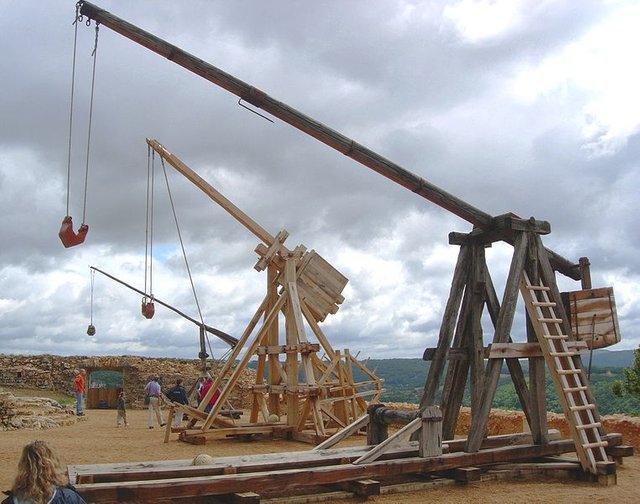
pic Wikipedia, Luc Viatour, CC-by-sa 3.0
“Whale wars” are a constant topic for Steemians, and many got involuntarily involved. Sometimes that means a big upvote, but in other times it means that 120 upvotes yield nothing because of one whale flag.
There are many reasons for whale wars, not least the personal ego. But there is also the power struggle resulting in a disagreement on what the best course of action is.
The most (in)famous is @berniesanders, who currently seems to be at war with @haejin, a user who gets ridiculous amounts of money for basically generic posts about crypto-charts and some soothsaying with them.
Berniesanders seems to disagree with those payouts and downvotes the posts, but also (collateral damage it is called today) everyone who comments there.
Knights
Knights are one of the centerpieces of the medieval society. It was ultimately their power that decided wars, because of their numbers. Every noble could count on a number of those warriors and the economical, political and military power they brought with them.
Outside of major wars, knights were often totally independent, and indeed often fought each other for valor, wealth or just to avoid boredom.
In Steemit a knight is called a dolphin. They have the power to upvote your post for several dollars, making a more reliable source of income than a whale. In numbers they are also able to counter everyone except the biggest whales.
Dolphins big and small often follow some whale or top-payout-poster just to upvote everything from them to reap the curation rewards. This works like a self-fulfilling prophecy (@papa-pepper is a good example, several users are definitely auto-voting him).
Artisans
All those who didn’t belong to a higher class, but where also not servants or farming the lands, can be called artisans.
Artisans had some skill and normally managed to have a life that was a bit better than that of the lowest class. Some artisans were also sought-after specialists and relatively highly paid.
There is no real name for them on Steemit – some call them tuna. Tunas are those users who are on the platform long enough and skilled enough to make some thousand steem with it and are now on the way to being a dolphin. They have to constantly work to reach that goal or they will be forgotten.
Serfs and Servants
The majority of the medieval society, at least three out of four people, belonged to the class of serfs and servants.
Some of them owned the land they farmed, but most only worked as serfs on the fields of some knight or noble. Depending on the age and locality they were practically slaves, not allowed to leave the land they worked on.
Working on a daily-paid basis or in time contracts were those people who worked outside the farming sector, as builders, carriers or whatever was open. If they were lucky they got to be a servant of some rich noble (or later merchant).
I don’t think I have to show anybody the similarity to minnows here, right?
Even if you write a good post, as a minnow, your chances to get more than one lousy dollar for a post are small. You are basically working night and day for the dolphins and nobles, who profit from you bringing good content by increasing their SP value. You even give them money directly by upvoting them, for the chance to get a few drops of curation rewards!
And of course every minnow dreams of being a noble – sorry, whale – some day in the future.
Guilds
Guilds were somewhat outside the basic feudal system. Most of them originated as a mutual protection alliance of traders or craftsman. They would often have (and enforce) a local monopoly on certain products or the trade with them.
Some of the guilds have grown to immense power, rivaling that of nobles and even lesser kings. The most known of those guilds is probably the northern Germany Hansa, which managed the trade in the Baltic Sea and North Sea.

pic Wikipedia, Wolfgang Hägele, CC-by-sa
Do we have guilds in Steemit? Of course we have!
We mostly call them curations trails. But there are other forms of guilds too, like the @steemcleaners, fighting spam. There is The Writer’s Block, a great place to learn the finer points of the steemit writing trade, especially for those who English is not the first language.
Then there is @Adsactly: Autonomous Decentralized Society Acting Cooperatively to Leverage You! - whatever that means.
Medieval guilds also insured and assured profits by preventing competition. In Steemit you cannot prevent people to create accounts, but you can flag. Let’s look at an example from just a week ago.
Someone downvoted one of the guild’s members because they disagreed on rewards (e.g. getting 3 digit $$ through guild-self-voting). Result?
We've noticed your hostile behaviour toward a member of our community. As a society of 2400+ people, we do not like bullying behaviour. Please, stop this right now or we will act accordingly and to the full extent of our power.
Now, that is a very friendly way of saying “Do what we want or else…!” You may even think it is bullying, but of course this guild does not like that and does not do that.
It instantly reminded me of the verbiage in international relations: “...we shall unfortunately feel compelled to consider the military option.”
(Voting-) Bots
You may have recognized that I didn’t talk about one important medieval group: the church. I would like to put them together with the bots.
On first glance that seems strange. But if you look closer, the similarities justify that comparison.
Churches (as religious institutions) gathered money to make themselves big – building big churches (the buildings) and institutions to help the poor. They took money from their believers and promised future profit (heaven instead of hell).
At the same time, even with all those “vows of poverty”, they often made the (higher) hierarchy quite rich.
Bots are the same. They collect money with the promise of future profits. They grow in wealth, and indirectly their controller and first users too (who get the most votes for mostly the smallest investment). They help the poor, the minnows, as long as those minnows believe in the bot (and pay him).
When they get big enough, both of them can influence the “normal” hierarchy of power and wealth.
Econonics
We have seen that the “society” structures of Steemit are very similar to medieval times. But what about the money? After all, Steemit promised money to everyone who brings good, original content to the platform.
Well, here again it is much like medieval times. The vast majority of users work (more or less) hard to get a lousy meal on the table while the biggest part of their work goes towards those who are already very wealthy and powerful.
Those who already are rich, in contrast, can slack off and get a multiple of those amounts for posting less good stuff and self-voting.
Between those are groups, sometimes formal, sometimes not, who upvote each other.
Conclusion
Was I right? Is Steemit like a medieval society, or did my imagination run wild? Decide for yourself or put the facts to a godly ordeal.
Whatever you decide, I wish you good luck, nice posts, and may the whales be with you!
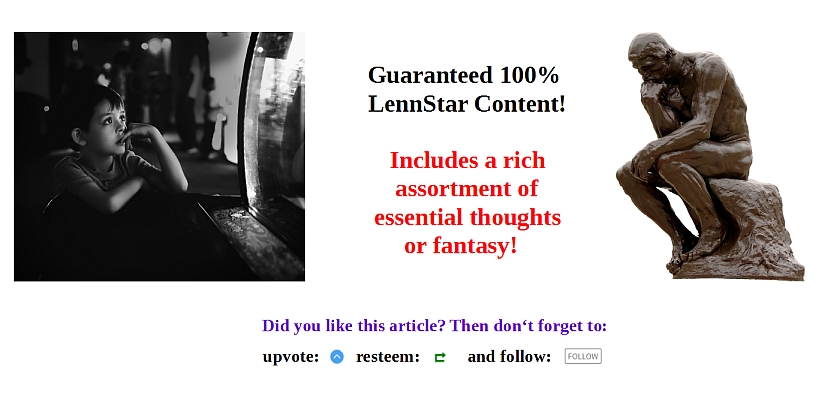

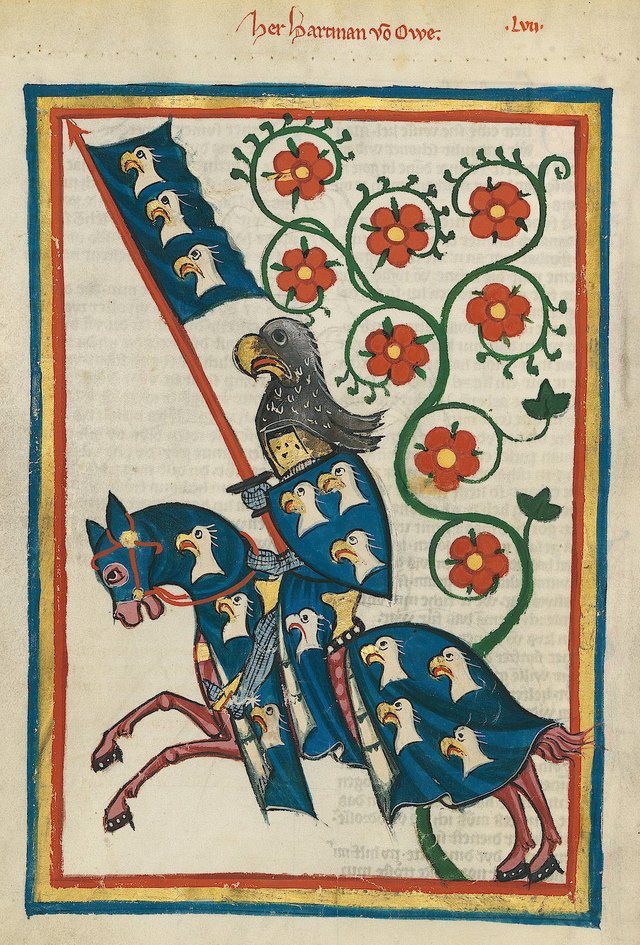
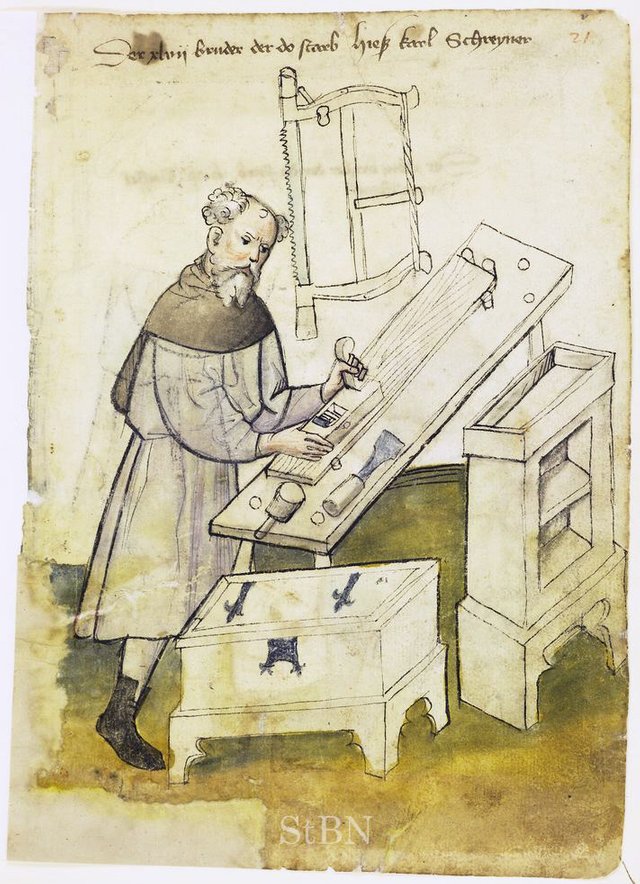
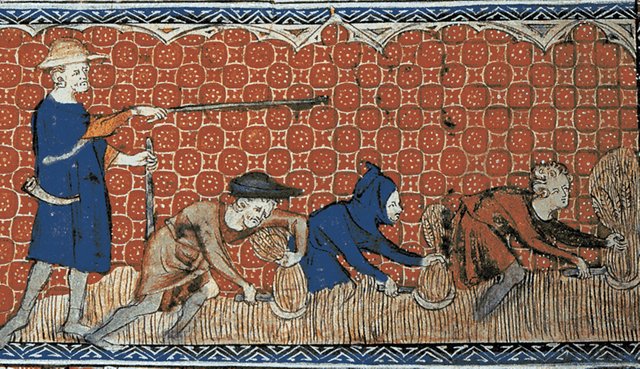


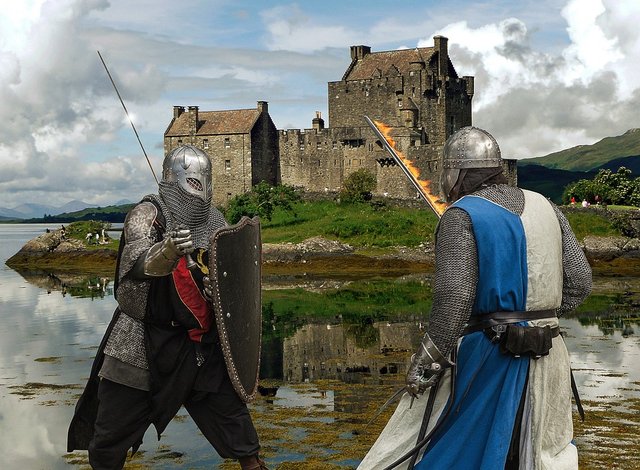
I am going to retweet this 'cos it is quite remarkable.
I don't know much about medieval times. I know more about our times. In our times, when minnows band together (for one cause or the other), they can topple over any heirarchy.
We have to form roving thug armies ... and maybe hire some homeless people to bust up the joint.
Yasss! This is a call to arms!!!
Anyway, how are you doing?
Doing ok ... not great ... not sure how much longer my current "couch surfing" situation will last ... I get several calls a day from men/women who barely speak English ... who seemingly can't read my resume ... but, they want to submit me to the same job 100 times ... I really don't know how much more of this I can take. I'm considering 2 options: a) tent city life or b) the "final" option.
Have you considered writing a book?
Write a book! I will read. Write something spectacular about yourself and call it fiction. ;)
I have some stuff on Amazon kindle already. Probably not well edited or proof read. But I can send you the info if you want.
I want.
https://www.amazon.com/Episode-36-Daniel-Sullivan-ebook/dp/B00U0NZPX4
https://www.amazon.com/Retirement-misadventures-Daniel-John-Sullivan-ebook/dp/B00W0KRP0Q/ref=sr_1_1?s=digital-text&ie=UTF8&qid=1516740834&sr=1-1&keywords=daniel+sullivan+retirement
https://www.amazon.com/Morny-DREK-Odyssey-Daniel-Sullivan-ebook/dp/B010KL91A8/ref=sr_1_1?s=digital-text&ie=UTF8&qid=1516740899&sr=1-1&keywords=Morny+DREK
https://www.amazon.com/16-Points-Adjustment-Daniel-Sullivan-ebook/dp/B077ZM2K56/ref=sr_1_1?s=digital-text&ie=UTF8&qid=1516740955&sr=1-1&keywords=sullivan+16+points
Full disclosure: these stories could use more editing, proof reading, and re-writing. Certainly rougher than some of the fiction you might be used to. And, there's more - if you finish this stuff.
If you wish you can see voting bots as roaming mercenaries - they fight for whoever hires them.
But that would have left me with nothing for the church, so...
If this is true, then I am a 12th level mage of the 45th Orc'ish artisanal cheese guild ...
As the self-appointed Steem Pope, I take umbrage at your analysis!
But seriously, while I get what you're trying to say, I don't buy the feudalism analogy.
The good point is you don't have to buy it, you can get it for free!
Haha, very good analogies, @lennstar! Nice!
I do fancy steemit a lot, but maybe the feudal economic model should be adjusted. Why is voting power proportional to wealth? Maybe we need a better mapping that encourages participation and supports the middle class, i.e., tunas and dolphins (or knights and artisans^^), rather than accumulating wealth for whales (nobles) and voting bots.
I thought about a different mapping function that actually does that, I'll post about it some time soon.
The basic problem with all those voting schemes is that you can just create an army of bots sitting where the best point is.
Great post, I am a knight!
I love to compare things of today with those of history. I often see very similar comparisons. It just goes to show that humans really haven't changed.
Knights, kings, serfs, artisans, church. Very clever. I would think the artisans are less like a tuna ranked user, and more like a merchant who already has an online business. These artists use steemit to advertise their goods to sell, and they make more profits that way than they do from the steemit caste system.
With a friend we had developed the theory that Steemit's community would eventually be divided into several kingdoms. This perfectly matches your text. Another thing, is it possible that I could translate your article to propose it to the French lecters? Thank you very much.
You are free to translate if you clearly link tho the original article and author.
(Like: This is a translation of @LennStar's article "Steemit is like a medieval feudal society")
You can see busy and the other frontends as different continents - all sitting on the same planet (blockchain) but very different in look ;)
lol, this is brilliant! big thumbs up
I notice, however, you did not include the Witnesses? Perhaps they are the Aristocrats - the highest of the nobility, of course. They were the ones who drove policy, often behind the scenes. They weren't all necessarily rich, but they did wield power and guide the king.
:)
Maybe they are the small kings - often without real power, but by birth and marriage connected to each other and such deciding the fate of the world!
lol, I think they are more the Dukes & Duchesses of the Court. ;)
Well, you certainly know more about that topic then I, Mylady.
haha, well only the English court maybe. The German court, I suspect, was far more complicated. All those principalities and such. :D
Well, I have been reading a lot of different takes on steemit and I have to say this one was the most amusing one, but you know what? In humor lies the truth and you can learn more from the comedians than from news anchors. (not that you are a comedian)
I am so sorry I found this post so late and there is not the reestem option on it anymore.
This was probably the best thing I’ve read all day...
May the whales be with you too 💚
Thanks you!
Yes, it is a dark time when comedians tell more truth then news shows.
Nice touch. I feel like you forgot some category - the pirates. In middle ages, some 2 millions of humans were stolen from the shores of the Mediterranean, from Slavic countries and transported to be sold on the slave markets of Ottoman Imperium. Even more, were stolen or just kid-napped from England to be enslaved in North America as the first slaves there. I can't really name those who were doing it, but those who amassed a fortune from doing this are still rich and known as well as their offspring.
@zeartul was one of the pirates here, but I guess there might have been others too.
You got an old one here ^^
Yeah, slave trade was always a thing, only the forms changed. The worst started with the "Conquest of the New World".
(I recommedn you read Daved Graeber Debt: The first 500 years)
https://steemit.com/bookreviewseries/@irastra/debt-david-graeber-book-review-3